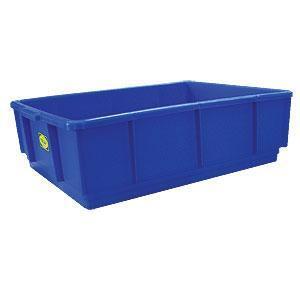How Industrial Plastic Bins and Stackable Plastic Crates Transform Food Safety and Compliance
Food safety is one of the most critical aspects of the global food industry. From farms to distribution centres and retail outlets, every stage of the supply chain must follow strict hygiene and compliance standards. Contaminated packaging or poor handling not only leads to financial losses but can also result in health risks and legal penalties. To address these challenges, businesses are increasingly adopting industrial plastic bins and stackable plastic crates. These modern solutions outperform traditional packaging and ensure that food handling meets international safety requirements.
The Challenges of Traditional Packaging in Food Safety
Historically, cardboard boxes and wooden crates have been widely used in food storage and transport. While inexpensive, they come with serious drawbacks:
- Moisture absorption: Cardboard loses integrity when wet, leading to collapsed boxes and spoiled goods.
- Bacterial growth: Wooden crates can harbour bacteria, fungi, and pests, making them unsuitable for safe food handling.
- Short lifespan: Disposable packaging must be replaced frequently, generating unnecessary waste.
These issues highlight the urgent need for better solutions like industrial plastic bins and stackable plastic crates.
Hygiene Benefits of Plastic-Based Solutions
Food safety regulations require packaging to be non-porous, washable, and resistant to contamination.
- Industrial plastic bins are easy to clean and sanitize, preventing cross-contamination between different food items.
- Stackable plastic crates with ventilated sides support airflow, helping fresh produce stay crisp while reducing the risk of mould.
- Their non-porous surfaces ensure that no moisture, bacteria, or chemicals are absorbed, keeping food safe from farm to shelf.
This compliance advantage is crucial for businesses aiming to meet standards such as HACCP (Hazard Analysis Critical Control Point).
Durability Under Real-World Conditions
Food distribution is rarely straightforward. Goods travel long distances, often across climates, and are handled multiple times. Packaging must be strong enough to withstand this journey.
- Industrial plastic bins offer durability against impacts, protecting fragile food items like fruits or baked goods.
- Stackable plastic crates maintain their shape even under heavy stacking, preventing crushing of delicate products.
- Unlike cardboard or wood, plastic containers are resistant to moisture, cold storage conditions, and pests.
This durability ensures products reach retailers in top condition, reducing spoilage and financial losses.
Streamlining Food Logistics and Distribution
Efficient logistics is vital for perishable goods. Every delay increases the risk of food wastage.
- Stackable plastic crates allow easy stacking in delivery trucks, maximizing load capacity and reducing transport costs.
- Their nesting feature saves return trip space, making logistics more cost-efficient.
- Industrial plastic bins can be color-coded or labelled to improve sorting and inventory tracking in warehouses.
These efficiencies translate into smoother operations and faster turnaround times, which are critical in food distribution.
Cost Advantages in the Long Term
Many businesses initially hesitate to invest in industrial plastic packaging due to higher upfront costs. However, the long-term benefits far outweigh these concerns:
- Reusability: A single crate can last for years, replacing dozens of cardboard boxes.
- Lower losses: Better protection reduces damaged and spoiled goods.
- Reduced compliance risks: Meeting hygiene standards prevents costly fines and recalls.
By incorporating industrial plastic bins and stackable plastic crates, businesses enjoy higher returns on investment while lowering operating expenses.
Supporting Sustainability and Brand Image
Consumers are increasingly conscious of sustainability in food production and distribution. Businesses are under pressure to adopt eco-friendly practices.
- Industrial plastic bins and stackable plastic crates are fully recyclable at the end of their lifecycle.
- Replacing disposable packaging reduces landfill waste and carbon footprint.
- Companies that adopt sustainable packaging improve their brand reputation with environmentally conscious customers.
By choosing reusable solutions, businesses not only comply with regulations but also gain consumer trust.
Industry Applications
The versatility of these solutions makes them suitable across the food and beverage sector:
- Fresh produce farms: Ventilated stackable crates maintain airflow to keep fruits and vegetables fresh.
- Dairy distribution: Strong, insulated bins support safe transport of milk, cheese, and yogurt.
- Bakeries and confectioneries: Durable bins protect delicate bread and sweets from crushing.
- Meat and seafood suppliers: Washable, hygienic bins prevent contamination during cold storage and delivery.
Regardless of the food category, these containers provide unmatched safety and reliability.
Conclusion
Food safety and compliance cannot be compromised. Traditional packaging materials fall short in durability, hygiene, and sustainability. By adopting industrial plastic bins and stackable plastic crates, businesses can safeguard perishable goods, streamline logistics, reduce costs, and meet strict regulatory requirements.
